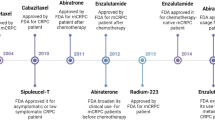Summary
Prostate-specific antigen (PSA) is a kallikrein-like serine protease that, for all practical purposes, is specific for prostatic tissue. PSA is usually detected at low concentrations (0.0–4.0 ng/ml) in the serum and is the most important tumor marker for detecting otherwise unsuspected prostate cancer; it also useful for monitoring the response of prostate cancer to various types of therapy. Androgen deprivation therapy (ADT) includes bilateral orchiectomy, luteinizing hormone-releasing hormone (LHRH) agonists, antiandrogens, and 5-alpha-reductase inhibitors. Treatment of benign prostatic hypertrophy (BPH) or prostate cancer with ADT usually decreases the serum PSA concentration. Recent basic science research has demonstrated that the expression of the PSA gene is controlled by androgens acting via the androgen receptor. Therefore, in some patients a low serum PSA concentration will be the result of hormonal down-regulation of the genetic expression of PSA and not the result of the antitumorigenic activity of the therapy. Nevertheless, in spite of the direct effect of ADT on PSA expression, PSA remains a valuable prostate cancer tumor marker for prognosticating the response to ADT and portending clinical progression after this type of treatment for most patients.
Similar content being viewed by others
References
Andrews PA, Young CY-F, Montgomery BT, Tindall DJ (1992) Tumor-promoting phorbol ester down-regulates the androgen induction of prostate-specific antigen in a human prostatic andenocarcinoma cell line. Cancer Res 52:1525–1529
Arai Y, Yoshiki T, Yoshida O (1990) Prognostic significance of prostate specific antigen in endocrine treatment for prostatic cancer. J Urol 144:1415–1419
Reference deleted
Csapo Z, Brand W, Walther R, Fokas K (1988) Comparative experimental study of the serum prostate specific antigen and prostatic acid phosphatase in serially transplantable human prostatic carcinoma lines in nude mice. J Urol 140:1032–1038
Food and Drug Administration (1992) Proscar (finesteride) package insert. Food and Drug Administration, Washington, DC
Gormley GJ, Stoner E, Bruskewitz RC, Imerato-Mcginley I, Walsh PC, McConnell JD, Andriole GL, Geller J, Bracken BR, Tenover JS, Vaughn ED Jr, Pappas F, Taylor A, Binkowitz B, Ng J (1992) The effect of finasteride in men with benign prostatic hyperplasia. N Engl J Med 327:1185–1191
Guess HA, Heyse JF, Gormley GJ (1993) The effect of finasteride on prostate specific antigen in men with benign prostatic hyperplasia. Prostate 22:31–37
Guess HA, Heyse JF, Gormley GJ, Stoner E, Oesterling JE (1993) The effect of finasteride on serum PSA concentrations in men with benign prostatic hyperplasia — results from the North American phase III clinical trial. Urol Clin North Am (in press)
Hanash KA, Mostofi KF (1992) Androgen effect on prostate specific antigen secretion. J Surg Oncol 49:202–204
Henttu P, Liao S, Vihko P (1992) Androgens up-regulate the human prostate-specific antigen messenger ribonucleic acid (mRNA), but down-regulate the prostatic acid phosphatase mRNA in the LNCaP cell line. Endocrinology 130:766–772
Kelly WK, Scher H, Mazumuda M, Schwartz M, Vlamis V (1992) Prostate-specific antigen (PSA) as a measure of disease outcome in metastatic hormone refractory prostate cancer (PC). Proc Annu Meet Am Soc Clin Oncol 11:A609
Leo ME, Bilhartz DL, Bergstralh EJ, Oesterling JE (1991) Prostate specific antigen in hormonally treated D2 prostate cancer: is it always an accurate indicator of disease status? J Urol 145:802–806
Lilja H (1985) A kallikrein-like serine protease in prostatic fluid cleaves the predominant seminal vesicle protein. J Clin Invest 76:1899–1903
Matzkin H, Soloway MS (1992) Response to second-line hormonal manipulation monitored by serum PSA in stage D2 prostate carcinoma. Urology 40:78–80
Matzkin H, Eber P, Todd B, van-der-Zwaag R, Soloway MS (1992) Prognostic significance of changes in prostate-specific markers after endocrine treatment of stage D2 prostatic cancer. Cancer 70:2302–2309
McConnell JD (1992) Current medical therapy for benign prostatic hyperplasia: the scientific basis and clinical efficacy of finasteride and alpha-blockers. In: Walsh PC, Retik AB, Stamey TA, Vaughn ED Jr (eds) Campbell's urology, 6th edn, update 3. WB Saunders, Philadelphia, pp 1–16
Miller JI, Ahmann FR, Drach GW, Emerson SS, Bottaccini MR (1992) The clinical usefulness of serum prostate specific antigen after hormonal therapy of metastatic prostate cancer. J Urol 147:956–961
Oesterling JE, Andrews PE, Suman VJ, Zincke H, Meyers RP (1993) Preoperative androgen deprivation therapy: artificial lowering of serum prostate specific antigen without “downstaging” the tumor. J Urol 149:779–782
Sensabaugh GF (1978) Isolation and characterization of a semen-specific protein from human seminal plasma: a potential new marker for semen identification. J Forensic Sci 23:106–115
Stamey TA, Kabalin JN, Ferrari M, Yang N (1989) Prostate specific antigen in the diagnosis and treatment of andenocarcinoma of the prostate. IV. Anti-androgen treated patients. J Urol 141:1088–1090
Wang MC, Valenzuela LA, Murphy GP, Chu TM (1979) Purification of a human prostate specific antigen. Invest Urol 17:159–163
Wang MC, Papsidero LD, Kuriyama M, Valenzuela LA, Murphy GP, Chu TM (1981) Prostate antigen: a new potential marker for prostate cancer. Prostate 2:89–96
Weber JP, Oesterling JE, Peters CA, Partin AW, Chan DW, Walsh PC (1989) The influence of reversible androgen deprivation on serum prostate-specific antigen levels in men with benign prostatic hyperplasia. J Urol 141:987–992
Wolf DA, Schulz P, Fittler F (1992) Transcriptional regulation of prostate kallikrein-like genes by androgen. Mol Endrocrinol 6:753–762
Young CY-F, Montgomery BT, Andrews PE, Qui S, Bilhartz DL, Tindall DJ (1991) Hormonal regulation of prostate-specific antigen messenger RNA in human prostatic adenocarcinoma cell line LNCaP. Cancer Res 51:3748–3752
Author information
Authors and Affiliations
Rights and permissions
About this article
Cite this article
Ruckle, H.C., Oesterling, J.E. Prostate-specific antigen and androgen deprivation therapy. World J Urol 11, 227–232 (1993). https://doi.org/10.1007/BF00185075
Issue Date:
DOI: https://doi.org/10.1007/BF00185075




